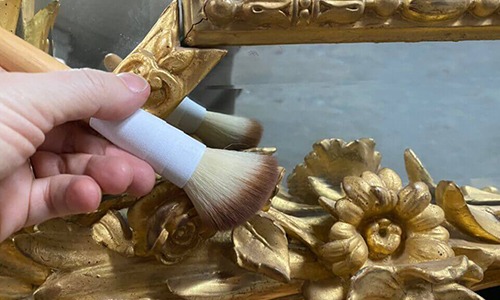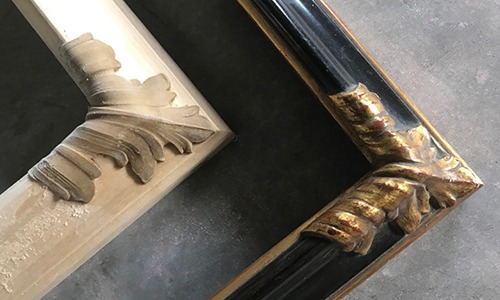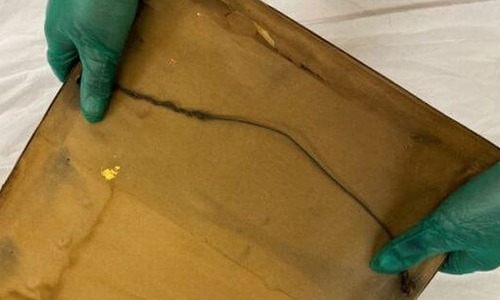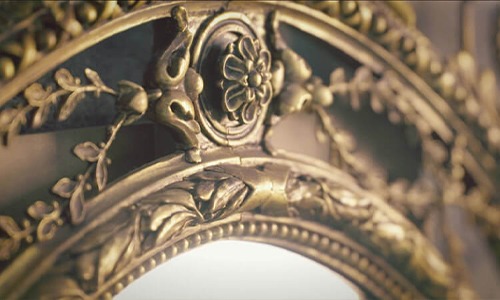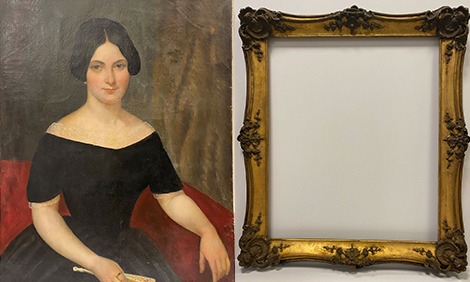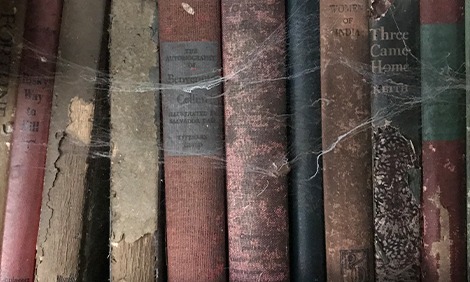How to Clean Specialty GLazing
How to Clean Specialty Glazing
By April Hann Lanford
While fine art glazing is designed to preserve and protect, it should also be cleaned and handled with care.
The following are recommendations based on the type of Tru Vue UV filtering glazing that we regularly frame and protect our client’s work with. If you have questions on what was used on your piece, please contact us, we want to ensure that the glazing continues to look as good as the artwork it protects!
Acrylic
Conservation Clear Acrylic
Materials:
Acrylic Cleaner
Clean microfiber cloth/lint-free cotton cloth
Directions:
With a damp microfiber cloth, apply light pressure and clean the surface.
Dry by blotting with a clean, slightly damp cloth.
-Never spray cleaner directly onto the surface, as it could damage the frame finish, as well as seep into the frame package.
-Never use paper towels or other paper-based products as they will scratch and abrade the surface.
-Never use any cleaning agents with ammonia.
Conservation Reflection Control Acrylic
Materials:
Mild soap and water solution
Clean microfiber cloth/lint-free cotton cloth
Directions:
Attempt to selectively spot clean using a dry microfiber cloth by wiping in a light, circular motion.
If dry cleaning is not effective, use a microfiber cloth with a mild soap and water solution.
Dry by blotting with a clean, slightly damp cloth.
-Never spray cleaner directly onto the surface, as it could damage the frame finish, as well as seep into the frame package.
-Never use paper towels or other paper-based products as they will scratch and abrade the surface.
-Never use any cleaning agents with ammonia.
-Never use acrylic cleaners or polishing agents
Optium Museum Acrylic
Materials:
Ammonia Free Glass Cleaner
Clean microfiber cloth/lint-free cotton cloth
Directions:
Spray a small amount of ammonia-free glass cleaner onto a clean microfiber cloth and wipe in a circular motion on the glazing.
Wipe the surface dry with a dry section of the cloth to address any resultant wipe marks.
-Never spray cleaner directly onto the surface, as it could damage the frame finish, as well as seep into the frame package.
-Never use paper towels or other paper-based products as they will scratch and abrade the surface.
-Never use any cleaning agents with ammonia.
-Never use acrylic cleaners or polishing agents on Optium glazing.
Glass
Conservation Clear Glass
Materials:
Ammonia Free Glass Cleaner
Clean microfiber cloth/lint-free cotton cloth
Directions:
Spray a small amount of ammonia-free glass cleaner onto a clean microfiber cloth and wipe in a circular motion on the glazing.
Wipe the surface dry with a dry section of the cloth to address any resultant wipe marks.
-Never spray cleaner directly onto the surface, as it could damage the frame finish, as well as seep into the frame package.
Conservation Reflection Control Glass
Materials:
Ammonia Free Glass Cleaner
Clean microfiber cloth/lint-free cotton cloth
Directions:
Spray a small amount of ammonia-free glass cleaner onto a clean microfiber cloth and wipe in a circular motion on the glazing.
Wipe the surface dry with a dry section of the cloth to address any resultant wipe marks.
-Never spray cleaner directly onto the surface, as it could damage the frame finish, as well as seep into the frame package.
Museum Glass
Materials:
Ammonia Free Glass Cleaner
Clean microfiber cloth/lint-free cotton cloth
Directions:
Spray a small amount of ammonia-free glass cleaner onto a clean microfiber cloth and wipe in a circular motion on the glazing.
Wipe the surface dry with a dry section of the cloth to address any resultant wipe marks.
-Never spray cleaner directly onto the surface, as it could damage the frame finish, as well as seep into the frame package.
Questions?
Are you unsure about what kind of glazing you have? Are you concerned about the condition of your piece?
Does your piece need further intervention or care?
Contact us at:
312-344-0331
April@artifactservices.com
Our collection of educational articles about
custom framing, collection care, and emergency response are updated regularly.
Click on each topic below for a menu of corresponding articles.
Collection Care Articles
By April Hann Lanford
Our collection of educational articles provides an introduction to many topics about the preservation and conservation of fine art, antiques, and fine furniture.
Topics are often written as a result of questions provided by our clients.
Emergency Care Articles
By April Hann Lanford
Our emergency care articles are a helpful introduction to how to prevent damage through preventative measures or art and antique collections. When a disaster strikes, prompt response and taking the right steps can mitigate further damage.
Antique Trader Articles
By April Hann Lanford
Visit our collection of articles that have been published in Antique Trader.
antiquetrader
For more than 60 years Antique Trader has been inspiring, informing, and entertaining the collecting community with timely...
Projects
By April Hann Lanford
A selection of Artifact’s most recent projects highlighting our conservation and preservation work. We present each unique story describing the conservation process from reviewing the history, cause of loss, and condition to the steps of the treatment.
Glossary
A collection of art and conservation terms along with makers and firms compiled into a glossary and highlighted throughout our website for reference.
We are available to assist you
Main Location
840 N. Milwaukee Ave, Chicago IL 60642
Mon-Fri: 9:00 am - 5:30 pm
Sat: 10:00 am-4:00 pm
Sun: Closed
Complimentary parking is available in the loading zone in front of the building
We can also serve you by appointment at our other locations in the Chicagoland area.
Additional Locations
Schiller Park • Highland Park • Lake Forest • Lincoln Park • Nashville, TN
Copyright 2024, Artifact Services, LLC | An Artmill Group Company
